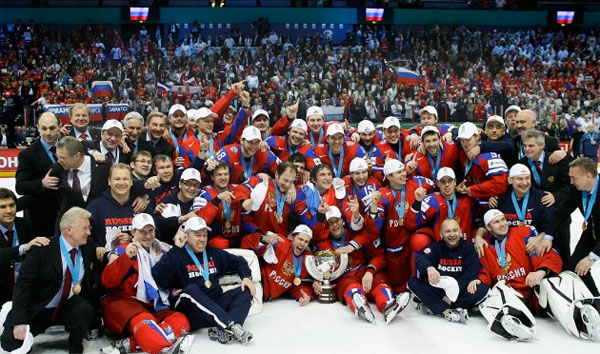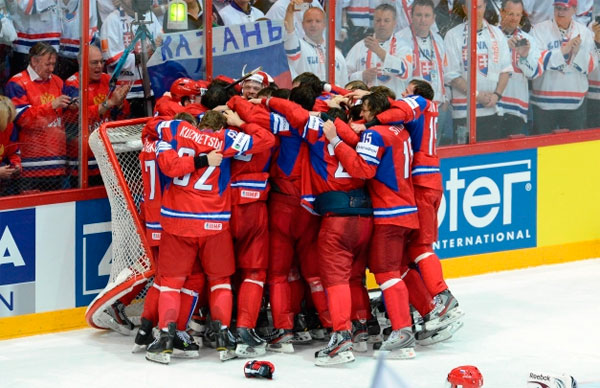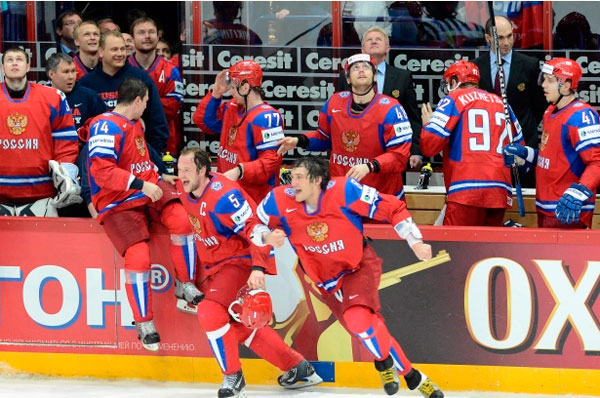
Champions Again!
/ Главная / Russkiy Mir Foundation / Publications / Champions Again!Champions Again!

The Russian national ice hockey team became world champions, having defeated Slovakia 6:2 in the finals. Russians played at the top level during the entire championship – they did not lose a single game, having won in all 10 matches and three years later returned the title of the world’s best national team.
In the run-up to the ice-hockey world cup, the Russian team was repeatedly criticized for rather unconvincing performances in the preparation games and few seemed to believe in ultimate victory. Yet there were not many reasons for criticism – the head coach invited different players to decide on the optimal roster using the trial and error method. Legionaries engaged in the NHL games were naturally absent. However, at the championship the national team was reinforced with NHL stars – even though Ovechkin and Semin arrived only for the quarterfinals – convincingly defeated all other teams, having proved its absolute supremacy.
Theoretically, the first games were largely formal, though playing against the non-hockey powers is sometimes more difficult than against the avowed authorities, for it’s not so easy to get revved up for the game. Nevertheless our national team defeated Latvia 5:2 and then Norway 4:2, though the beginning of that match was hard on Russia and the first two periods were noted for equal emulation. The Norwegian goaltender was very reliable, Scandinavians resorted to pressing our offensive lines – all five Norwegian players kept it tight at the back, occasionally putting up an odd-man rush. The third period marked a sort of watershed.
Russian character
Having defeated Germany 2:0 and Denmark 3:1, our team then had to face one of its longstanding rivals — the Swedes. The latter caused more problems for our team than any other team at this tournament, but during that match our national team proved they got a character. The hosts grabbed initiative at the very start and rushed forward 3:1. However Bilyaletdinov's team managed to turn the game and scored six straight goals in a streak (the final score – 7:3).
Then came the turn of Czechs, traditionally a very inconvenient team for the Russians, against whom they scored two unanswered goals. Near the end of the group stage Russians took on Italy and won 4:0. Seven games and 21 points; Swedes had 18 points, Czechs – 14, and Norwegians – 13. The rest packed for the next season.

The quarterfinals against the same Norwegians already defeated at the group stage was by no means an easy walk, as could be expected by those fans who began watching the championship at that stage. Warming up during the first 20 minutes as usual, our national team stepped up in the second and third periods. This time the beginning was not very successful but eventually Russia triumphed again 5:2. One of the goals was scored by Ovechkin who flew on the eve from Washington D.C. with Semin.
Yet the issue of the semifinals was uncertain.
Revenge
We had to play against the Finns who not only co-hosted the championship together with Swedes, but were also last year's champions who twice defeated our team at the previous championship, including in the semifinals, when the Russian national team, led by Vyacheslav Bykov, lost to the future champions 0:3. This time our players faced almost the same team that won the gold medals a year ago. Yet this year the Russian national team was very much different from last year's.
At the current championship Finns demonstrated interesting hockey and reached the semifinals after eliminating the US national team. However, the local fans put too much pressure on their players as they wanted to see their idols only on the offensive. Their only answer to the Russian challenge, though, was a very even roster without clear leaders, such as Evgeny Malkin in the Russian team who could easily take charge at the right moment and lead the entire team. Yet Finns were thought to be favorites.
Gaining revenge on Finns was a matter of honor and national pride for Russia, since much was at stake. Yet it was the Suomi team that opened the score, having demonstrated an excellent hockey in the first period. Our team outshot the opposing team and still lost the first 20-minute period 1:2. Our goalie Varlamov made almost no mistakes and Malkin and Ovechkin rose to the occasion as usual. Even when Malkin who was the go-to guy at this tournament fell down after a clash in the second period, struck his arm against the board, and left for the checkroom, the players were not upset or dispirited and scored a goal in his absence. Alex Ovechkin shot a rocket in the upper corner of the net and caught the Finnish goalie unawares. And then Malkin came back and completed his second hat trick at this championship (the previous one against the Swedes). Bilyaletdinov's players did not leave the slightest chance to their opponents – 6:2.

Eventually the last year's champions could not even win the bronze, ceding it to the Czech national team (2:3). Probably they were shocked by the overwhelming defeat at the hands of the Russians.
Finals
In the finals the valorous Russian team had to play with the heavy underdog Slovakia that managed to eliminate Canada in the quarterfinals and to defeat Czechs in the semifinals, though. Nobody expected in the finals this team which last time reached the play-off stage at the Moscow world championship. Even on their home ice Slovaks could not go farther than the group stage.
In the final game the Russian national team outplayed its opponent in every aspect of the game. And though the first trio led by Malkin scored most of the goals, other trios scored too. Furthermore Russia reached the finals without injuries unlike Slovaks who had to play with only five defensive players. Our national team won all the games and Slovaks were already larger than life, having defeated Canadians and Czechs.
Russians were just stronger – that's the bottom line. The Russian national team and its coaches just could not miss out on the gold medals. The only problem was to pull together after the players strained their every sinew in the game against the Finns. Slovaks had at least a theoretical chance: they could seek it in thick defense and occasional odd-man rushes. They beat Czechs using this very tactic. Yet this time they had to play against the much more organized and disciplined team with stronger defense, star-studded offensive line and a higher class goaltender.
Nevertheless, in accordance with the established tradition, it is the Slovaks that opened the score at the second minute of the first period when Hara fired a rocket from the blue line and Varly was unable to save. Russian forwards organized a relentless forecheck and kept up the puck in deep for long stretches, sustaining a lot of pressure. Yet they initially squandered away one moment after another. But at the tenth minute of the first period Semin was adequate to the task, scoring his first goal at the championship with Ovechkin's assist. The teams left for the first break with 1:1 on the table, but in the second period Russia overwhelmed Slovakia with three goals scored by Perezhogin, Tereshchenko and Semin again. In the third period Datsyuk scored the fifth goal with Semin's assist and Hara's second goal scored at the 51st minute during the power play could change nothing. Malkin dropped the curtain in that game – 6:2.
Semin was celebrated as the most valuable player in the finals, while Evgeny Malkin who helped the Russian national team win in all 10 games became the MVP of the entire tournament. Malkin also ended up winning the goalscorer race with 19 points (11 goals plus 8 assists). Earlier in this season he also triumphed as the best goalscorer of the NHL season with 50 goals and 59 assists. This is his second Art Ross Trophy in his career, following a similar feat in the 2008-2009 season. Curiously enough, only great Wane Gretzky once became the best NHL and the best world championship goalscorer in the same season.
So no wonder that the championship's directorate proclaimed Evgeny the best forward and journalists included him with defenseman Nikulin in the world dream team.
There were quite a number of organizational flaws in that championship. IIHF President Rene Fazel mentioned that the hosts decided to bring advertising to minimum while the ticket prices were rather high. Swedes surprised with their devil-may-care attitude towards the participating teams, including the Russian one. Our players were accommodated in an uncomfortable hotel opposite the soccer arena under construction and had to change their boarding in the course of the tournament. And after the quarterfinals the hosts refused to launder the uniforms of our team on the premise that the championship was over for them, though that was their direct duty. Eventually this problem was settled through the directorate. In this context the decision of IIHF to hold the next year's championship in Sweden and Finland again seems very strange. But these are all minor details compared to the fact that Russians became champions of the world.
Igor Oransky
New publications

 Mikhail Kalatozov, a director who transformed the world of cinematography in many ways, was born 120 years ago. He was a Soviet film official and a propagandist. Above all, he was capable of producing movies that struck viewers with their power and poetic language.
Mikhail Kalatozov, a director who transformed the world of cinematography in many ways, was born 120 years ago. He was a Soviet film official and a propagandist. Above all, he was capable of producing movies that struck viewers with their power and poetic language.  Ukrainian authorities have launched a persecution campaign against the canonical Ukrainian Orthodox Church (UOC), the biggest one in the country's modern history. Over the past year, state sanctions were imposed on clergy representatives, searches were conducted in churches, clergymen were arrested, criminal cases were initiated, the activity of the UOC was banned in various regions of the country, and monasteries and churches were seized.
Ukrainian authorities have launched a persecution campaign against the canonical Ukrainian Orthodox Church (UOC), the biggest one in the country's modern history. Over the past year, state sanctions were imposed on clergy representatives, searches were conducted in churches, clergymen were arrested, criminal cases were initiated, the activity of the UOC was banned in various regions of the country, and monasteries and churches were seized.  When Nektary Kotlyaroff, a fourth-generation Russian Australian and founder of the Russian Orthodox Choir in Sydney, first visited Russia, the first person he spoke to was a cab driver at the airport. Having heard that Nektariy's ancestors left Russia more than 100 years ago, the driver was astonished, "How come you haven't forgotten the Russian language?" Nektary Kotlyaroff repeated his answer in an interview with the Russkiy Mir. His affinity to the Orthodox Church (many of his ancestors and relatives were priests) and the traditions of a large Russian family brought from Russia helped him to preserve the Russian language.
When Nektary Kotlyaroff, a fourth-generation Russian Australian and founder of the Russian Orthodox Choir in Sydney, first visited Russia, the first person he spoke to was a cab driver at the airport. Having heard that Nektariy's ancestors left Russia more than 100 years ago, the driver was astonished, "How come you haven't forgotten the Russian language?" Nektary Kotlyaroff repeated his answer in an interview with the Russkiy Mir. His affinity to the Orthodox Church (many of his ancestors and relatives were priests) and the traditions of a large Russian family brought from Russia helped him to preserve the Russian language.

 The leaders of the Friends of the Great Russia cultural association (Amici Della Grande Russia) in Italy believe that the Western policy of abolishing Russian culture in Europe has finally failed. Furthermore, it was doomed to failure from the beginning.
The leaders of the Friends of the Great Russia cultural association (Amici Della Grande Russia) in Italy believe that the Western policy of abolishing Russian culture in Europe has finally failed. Furthermore, it was doomed to failure from the beginning.  Name of Vladimir Nemirovich-Danchenko is inscribed in the history of Russian theater along with Konstantin Stanislavski, the other founding father of the Moscow Art Theater. Nevertheless, Mr. Nemirovich-Danchenko was a renowned writer, playwright, and theater teacher even before their famous meeting in the Slavic Bazaar restaurant. Furthermore, it was Mr. Nemirovich-Danchenko who came up with the idea of establishing a new "people's" theater believing that the theater could become a "department of public education."
Name of Vladimir Nemirovich-Danchenko is inscribed in the history of Russian theater along with Konstantin Stanislavski, the other founding father of the Moscow Art Theater. Nevertheless, Mr. Nemirovich-Danchenko was a renowned writer, playwright, and theater teacher even before their famous meeting in the Slavic Bazaar restaurant. Furthermore, it was Mr. Nemirovich-Danchenko who came up with the idea of establishing a new "people's" theater believing that the theater could become a "department of public education."  "Russia is a thing of which the intellect cannot conceive..." by Fyodor Tyutchev are famous among Russians at least. December marks the 220th anniversary of the poet's birth. Yet, he never considered poetry to be his life's mission and was preoccupied with matters of a global scale. Mr.Tyutchev fought his war focusing on relations between Russia and the West, the origins of mutual misunderstanding, and the origins of Russophobia. When you read his works today, it feels as though he saw things coming in a crystal ball...
"Russia is a thing of which the intellect cannot conceive..." by Fyodor Tyutchev are famous among Russians at least. December marks the 220th anniversary of the poet's birth. Yet, he never considered poetry to be his life's mission and was preoccupied with matters of a global scale. Mr.Tyutchev fought his war focusing on relations between Russia and the West, the origins of mutual misunderstanding, and the origins of Russophobia. When you read his works today, it feels as though he saw things coming in a crystal ball...